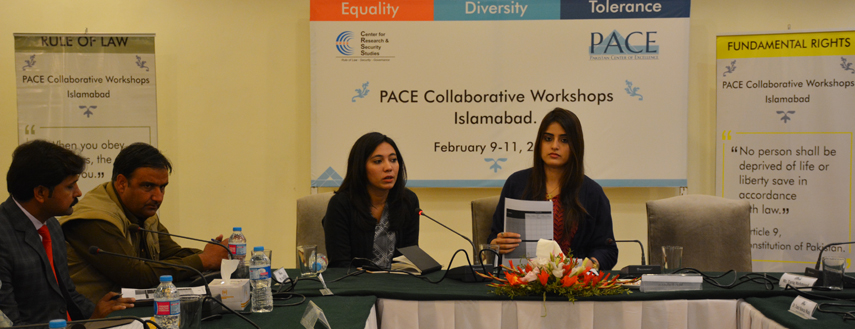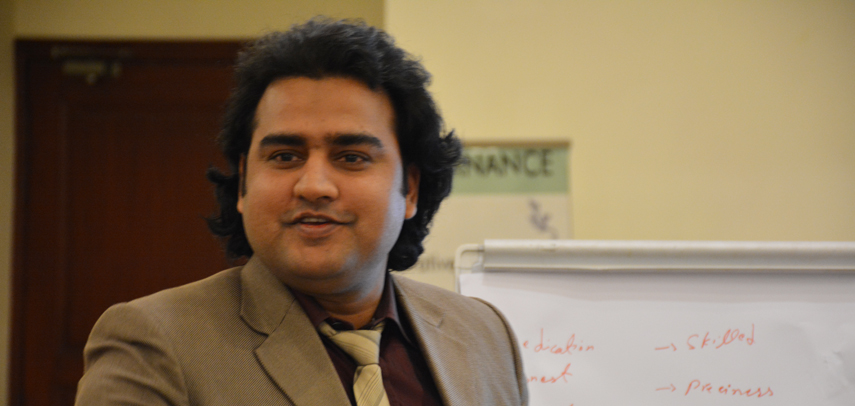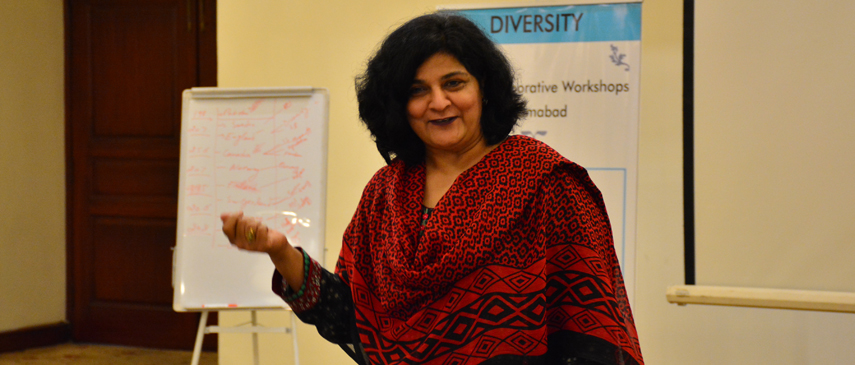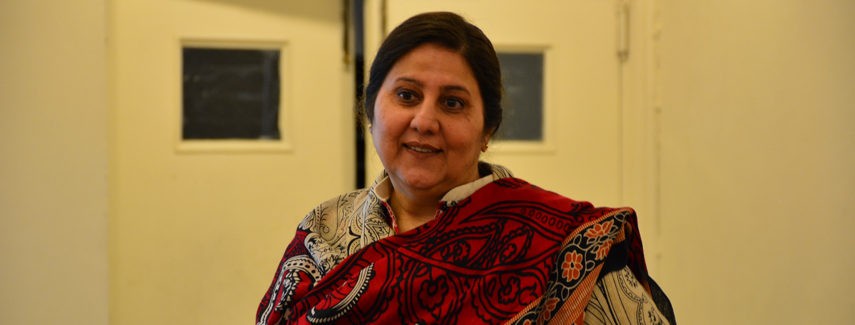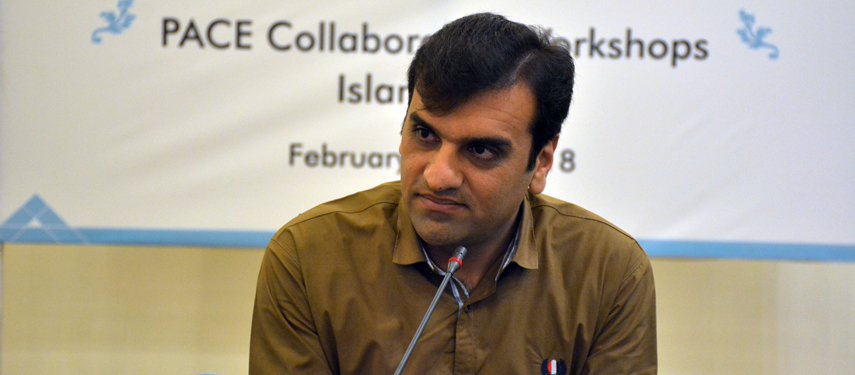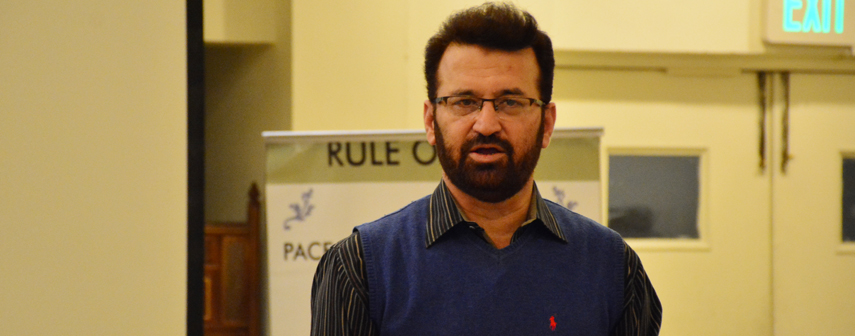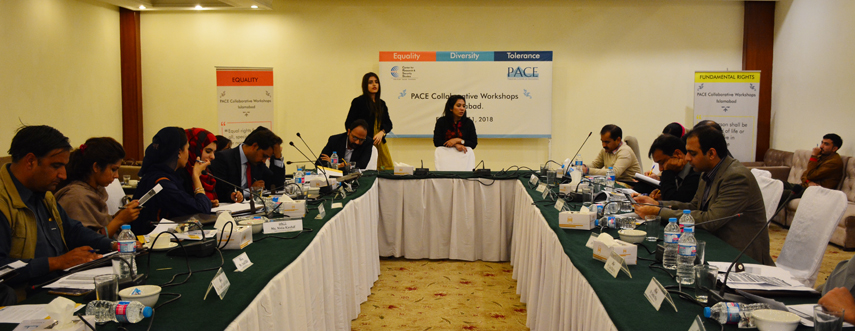The Center for Research and Security Studies (CRSS) conducted the 26th three-day PACE Collaborative workshop for young university lecturers and professors from February 9-11, 2018, at Hill View Hotel, Islamabad. The workshop was conducted under the umbrella of the Pakistan Center of Excellence (PACE), a counter-radicalization, pluralistic values focused project, in collaboration with the Dutch Government. Participants included young university lecturers and professors from all across Pakistan including Sindh, Balochistan, Punjab, KP, AJK, FATA and GB.
OPENING
Ms. Farhana Kanwal, Project Coordinator, welcomed participants to the workshop, saying that PACE is put together by CRSS to counter radicalization, inculcate critical thinking, question preconceived notions and narratives, and embed the national discourse in constitutionalism and the rule of law. She said PACE is grounded in the universal values of tolerance and acceptance; tolerance is one virtue that leads to range of other factors such as perseverance, coexistence and the idea of peace building.
Ms. Kanwal elaborated on the objectives of the training saying equal citizenry is a concept which is guaranteed in all the constitutions of the developed countries, including Pakistan. We need to consciously treat all Pakistanis as equal citizens and should respect their rights. She said that the primary objective of the workshop was to trigger critical thinking through a discourse anchored in fundamental global values such as socio-political diversity, acceptance of diversity, rule of law and equal citizenry. The idea is to create a critical mass of young leaders equipped with the skills to critically analyze issues, look at each other as equal citizens, and correct misconceptions about marginalized communities.
Dr. Tauqeer Hussain: National Security and Elements of Integrity for a Nation
Dr. Tauqeer Hussain was first speaker of the day and kicked off his session on the topic of “National Security and Elements of Integrity for a Nation.” He described few elements for the integrity of an individual as follow:
- Honesty
- Not corrupt
- Truthful
- Competent and resourceful (not dependant on others)
- Believes on merit rather nepotism
- No criminal record
- Respect for all regardless of Politico-religious identity
- Believes on ‘dignity of humanity’
- Holds no gender discrimination
- Diminishes all Ethnic and sectarian elements of distinction in his/ her life
- Even good health and education also falls in the integrity of an individual, which are important ingredients to build confidence, mental effectiveness, and physical fitness.
He linked the above mentioned characteristics to the Article 62 and 63 of the Constitution of Pakistan. According to him, these characteristics define a person’s character and personality. After having a detailed session on operationalization of the elements of integrity, Mr. Hussain charted a few elements of integrity for a nation which were agreed upon by the participants as well. These elements are as under:
- health insurance
- free education
- adequate housing facility
- employment opportunities for all
- social cohesion
- entertainment facilities
- community engagement programs
- State allowances
- innovation
- research and development
- science and technology
- strong institutions
- strong military
- strong economy
- stable political system
- security for all
- justice for all
- public transportation
- secularism
- freedom of speech and work
- liberty
- pursuit of happiness
- equal citizenship
- provision of social and political rights
- free and fair elections
- good governance
- absence of nepotism and corruption
- absence of violence
- absence of fundamentalism, extremism, and terrorism
- democratization rather personalization
- sense of constitutionalism rather nationalism, etc.
Ms. Shagufta Khalique: Respect for Diversity, Rights and Opinions
Ms. Shagufta Khalique opened the session with a speech on pluralism and respect for diversity. She elaborated, “As far as pluralism and diversity is concerned, it is difficult to make people understand that their differences are a sources of strength. One tends to develop a certain kind of attitude towards a certain ethnic, cultural and religious group, if brought up in an environment that is not tolerant. Argument and reasoning needs to be done in a positive way to correct conflicting views. Tolerance is something that expands with exposure to different levels and learning more about diverse groups. One should be open and accommodating to all the differences that exist in a diverse society. There are different systems of beliefs whether religious, cultural, economic or social, they may be equally correct for the people who believe in them.”
Pro-existence means accepting others with all their beliefs, morals, characteristics and positive and negative traits wholeheartedly and vice versa. It can only be achieved only when we believe in pluralism respecting and accepting the fact of being different.
Ms. Naila Mir: Effective Student Handling
Ms. Naila Mir kicked off her session on the topic of “Effective Student Handling”. She started her session on discussing the myths and realities regarding teaching methodologies in the context of Pakistan. She shared, “You don’t need any inborn talent to become great at something. Talent can be developed and for that you need the motivation and practice. Learning through a different method may reduce effort and time and make students understand the message. A teacher should give feedback and help students identify own areas and adopt for a positive approach to overcome the weaknesses. You can help them speed up their learning tenfold by helping them identify and use the right methods.”
Dr. Azhar Qazi kicked off his session on the topic of respect for diversity, rights and opinions. He said, “Teachers are brain of a society and I believe that teachers have the ability to bring the positivism in society. We are here to learn how to digest the concepts of diversity. We most of the time use the term respect to seek attention. We have to know the real meaning of this word to start implementing in our lives. Appearance of a person should never define his orientation. I look like a religious person but actually I’m not. I was serving in Pakistan Navy as an officer but later I joined the Afghanistan war. I was in Bagram in 2001 when America first attacked on October 8th. I never wanted to save the people who don’t opt for veil, who listen to the music, who don’t offer prayers regularly and who don’t follow the teachings of Islam. I didn’t belong to any conservative background. I believed the one who is not abiding by the teachings of Islam should be beheaded. I used to thin that non-Muslims have no right to live on earth. The war period ended: I came back after experiencing the bitter realities of life. Our teaching material never tells us about the difference of opinion our ascendants have had. I, as a mujahid, observed that the commanders are being served with the most lavish food instead of the food which was given to an ordinary mujahid. VIP protocol was given to the senior commanders. It was contrary to the message that was given to us for the establishment of an Islamic state. I came back and analyzed what’s wrong with my mentality. I started realizing that this is all hypocrisy and people are playing dual games in the name of “Jihad”. I started analyzing the things which I didn’t find in accordance with Islam and which forced me to join the militants. My research and study brought change in my mind set and I decided to quit the so called Jihad. What I have learned from all this is that we don’t have any right to take anyone’s life on the basis of our false perceptions. Everybody has conscience to think and adopt their lives according and we have no right to interfere.”
Ammad Khaliq: Media and Ethics
Mr. Ammad Khalique kicked off his session on “Media & Ethics”. He started with the definition of “Media” and “Ethics”, media is the collective communication outlet or tool that is used to store and deliver information or data. Specialized mass media channels include print media, social/digital media, photography, advertising, cinema, and broadcasting (Radio, TV). Speaking on the freedom of expression, he referred to Article 19 of the UN Charter, “Everyone has the right to freedom of opinion and expression; this right includes freedom to hold opinions without interference and to seek, receive and impart information and ideas through any media and regardless of frontiers.”
He defined ethics as the way people behave based on their beliefs about what is right and wrong and how it influences their behaviors and values. He shared his views on ethics in journalism with following points:
- Seek truth and report it
- Minimize harm
- Act independently
- Maintain standards of decency
- Be accountable
He also said that being neutral and presenting authentic news is one of the values that should be kept in mind while reporting certain issues. Media is bound in some cases and cannot be open and expose the facts. He said that words are sometimes misinterpreted and other times twisted when reporting sensitive issues; therefore, extreme care should be taken while debating on such issues. He stressed that the reporters while broadcasting should use decent language. He shared few laws and ethics that are binding upon media:
- Cyber Stalking
- Cyber Bullying
- Cyber Masking
- Cyber Frauds
- Hate Speech
- Defamation
- Intrusion to Privacy
- Harassment
- Cyber Crime Bill 2016
- Cyber Wing (FIA)
Mr. Safiullah Gul: Motivation and Leadership
Mr. Safiullah Gul was the last speaker of the workshop and spoke on the topic of ‘Leadership and Motivation’. He began with the saying that “he who fails to plan actually plans to fail” and shared stories of people who alone have changed the course of history, with motivation and persistence, despite all the opposition.
He said that successful leadership determines the extent of efforts directed towards a certain goal. He presented his model of goal-seeking i.e. activation, persistence and intensity. “Being alone doesn’t actually matter if you have goals and objectives set in your mind. To achieve these goals, you actually need to overcome your fears and insecurities. An individual sometimes can set an example and be motivation for others,” he shared.
The session, filled with activities to enhance creative and critical thinking, focused on looking at things from a slightly different perspective to encourage problem-solving.
CLOSING
Ms. Zehra Zaidi, Project Coordinator, PACE, in her concluding remarks, insisted that there is a dire need to revisit the widespread preconceived notions that have been passed through cultural values in the society over generations. Teachers, with the responsibility of imparting values to the young generation in educational institutions, are the most valuable engines that can challenge common negative narratives that promote hatred and bigotry. She said that teachers have the ability to shape an entire generation’s mindset to propagate tolerance, diversity and equality.
She shared that participants need to conduct these activities with their students to inculcate adherence to the rule of law and equal citizenry. CRSS provides financial and logistic support in this regard to lecturers and professors so that they can foster the universal ideals of tolerance and diversity in the young generations.

